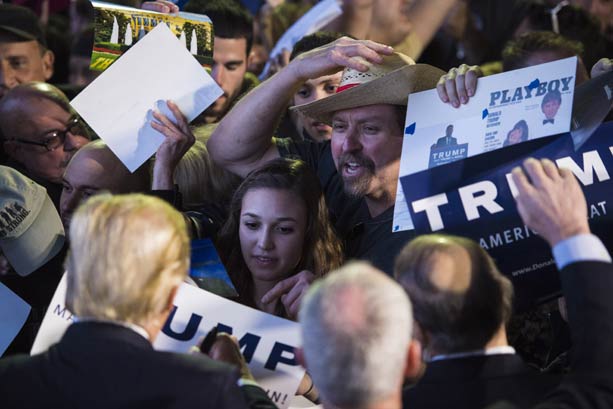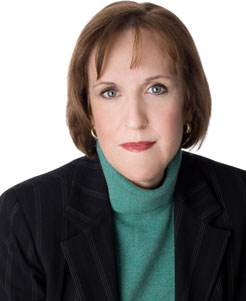 Washington Post photo by Jabin Botsford
Washington Post photo by Jabin Botsford
With the increasingly loud talk of a contested Republican convention, the obscure process of picking who actually gets to be a delegate is about to get underway in states across the country - with an urgency that has not been felt in decades.
These are the 2,472 people who will be filling Cleveland's Quicken Loans Arena in July, many wearing silly hats and waving placards. Normally little more than props in a weeklong infomercial, delegates could instead be the powerbrokers who determine the nominee at the GOP convention this time around.
Nearly all will be required to vote for a specific candidate on the first ballot, based on the results of the primaries and caucuses in their states. But if no candidate wins enough delegates to clinch the nomination, there will be subsequent rounds of voting. In that scenario, the vast majority of delegates would be free to vote as they please.
The potential for intrigue is enormous. State delegations who vote for one candidate on the first ballot could actually turn out to be sleeper cells for another as the voting proceeds.
Nor are they bound at any point to support the candidate to whom they are pledged on fights over rules, credentials, the platform or the vice presidential nominee. Those kinds of battles can determine whether the convention is an orderly coronation or a street fight, possibly even putting new names in contention.
If it comes to that, a nominating campaign that has already defied every expectation and every norm would go even deeper into uncharted territory. The Republican electorate would be further splintered, jeopardizing the party's chances to win in the fall and its ability to restore any semblance of functionality.
The identities and loyalties of individual convention delegates could become the subject of intense interest and scrutiny. The process of selecting them will be crucial and will be the subject of hand-to-hand combat in nearly every state over the next few months. In the Internet era, there is no such thing as a smoke-filled backroom; once-anonymous delegates could find themselves feeling the heat from all sides.
South Carolina GOP Chairman Matt Moore said he has already warned those who may represent the Palmetto State as delegates: "Expect every person in America to have your cellphone numbers and email addresses."
Only a handful of delegates have been named so far across the country. Most will be selected at local and state party gatherings, which means that the picks will be heavily influenced by the GOP establishment in those states - governors, party chairmen, elected officials, donors and longtime activists. Usually, the mechanics are of little consequence, given that the nomination is locked up well in advance of the convention.
This year, however, there is the very real possibility that Donald Trump could reach Cleveland with a plurality of pledged delegates, but short of the 1,237 majority it takes to claim the top of the ticket on the first round of balloting. Were Trump to arrive with the most delegates and leave without the nomination, "I think you'd have riots," he said Wednesday on CNN.
Noting that "many, many millions of people" have voted for him, Trump added, "if you disenfranchise those people and you say, well I'm sorry but you're 100 votes short, even though the next one is 500 votes short, I think you would have problems like you've never seen before. I think bad things would happen, I really do."
The system, however, says otherwise. "You don't get the nomination if you're close. This isn't like horseshoes and hand grenades. There are no points in close. You have to get 1,237," said Stephen Duprey, a mainstay in New Hampshire politics and a member of the Republican National Committee. Each state has its own peculiar system for naming delegates after the results of its primary or caucus are in.
Largely left out of the equation: The candidates themselves.
Fully 73 percent of delegates are selected without direct input from the presidential contenders, by state party executive committees or at state and local conventions, said veteran GOP campaign lawyer Ben Ginsberg. "The campaigns have to be sure their people and people who are loyal to them are elected as delegates. That is a complicated process, and requires on-the-ground organizing."
Virginia is a good example. As a result of its March 1 primary, Virginia's convention delegation will be casting 17 votes for Trump; eight for Cruz and five for Ohio Gov. John Kasich. It will also give 16 votes for Sen. Marco Rubio (R-Fla.) and three for retired neurosurgeon Ben Carson, even though they have suspended their campaigns since the primary.
Of Virginia's 49 convention delegates, 33 will be chosen at district conventions between now and June 1, and 13 will be picked at the state convention at the end of April. State chairman John Whitbeck and the national committeeman and committeewoman are the remaining three.
"This year, it's like the campaigns are actually taking notice" of a normally sleepy and parochial process, Whitbeck said. "We see the most activity with the Cruz campaign in Virginia, in terms of an organized effort."
Officials elsewhere also say that Cruz's forces seem most engaged in state and local delegate selection.
"What we are focused on is after we won a state, to go back in and make sure we got delegates to hold their commitment to vote for our campaign. That's a laborious process, and we are absolutely doing that," said Cruz's campaign manager Jeff Roe.
Typically, "once the election's over, [delegates] are nominated from state county and congressional districts to be nominees to their state conventions. In that process, we make sure that we have slates of people that are supporting Ted Cruz," Roe explained. "So that's a county-by-county, congressional-district-by-congressional-district, state-by-state process that's ongoing for the states that have already voted."
The Trump campaign is putting a team in place to track the delegates who have already been designated on state ballots, said senior advisor Ed Brookover, and will coordinate with its state staffs to monitor delegate selection.
Brookover, who is managing the process for the Trump campaign, says that skepticism in its ability to compete in this sort of process is "wishful thinking on the part of Mr. Trump's opponents."
He did not say how many staff members will ultimately be assigned to tracking delegates, but expressed confidence that the campaign has the resources and the organizational muscle necessary to navigate the system.
Still, the process predates Trump's candidacy in some cases. All of South Carolina's 50 delegates, for instance, will be committed to supporting Trump on the first ballot. But to become a national delegate, someone has to have been a delegate to last spring's state convention, which happened before Trump was even in the race.
"We have a known delegate pool," South Carolina chairman Moore said. And their allegiances are likely to be closely tied to state officials such as Gov. Nikki Haley and Sen. Lindsey Graham, both of whom have tangled with Trump.
As for himself, Moore said, his decision on subsequent ballots, should they happen, will be based on which candidate has the best chance in the fall, which has the most fealty to the party platform, and possibly the selection of a running mate.
There are states where the candidates have more of a say in selecting delegates.
New Hampshire, for instance, is a rare one where delegates have already been named, and they were based on slates offered by the candidates themselves. Trump's own campaign manager, Corey Lewandowski, will be a delegate from the Granite State.
"New Hampshire is objectively one of the fairest delegate selection processes," state party executive director Ross Berry said. "The control rests almost entirely with the campaigns and the candidates and the voter.
Looking ahead, the campaigns will not only be tasked with tracking and lobbying delegates, but will also need to keep an eye on the emerging composition of the Republican National Convention Rules Committee. That committee of more than 100 will carry wide authority over the nominating rules at the convention, including rules over who can be nominated at all on the floor of the convention.
As it stands, one controversial rule dictates that candidates have to have won at least eight states with a majority to be nominated on the floor. Trump is the only candidate to have passed that benchmark thus far - which, ironically, was initially intended to protect establishment-favorite Mitt Romney in 2012.
The composition of that committee will be decided in proxy fights between the establishment and grass-roots wings of the party at the state level. Party officials in each state will select two delegates to appoint to that committee - which is separate, and larger, from the RNC's rules committee - and will have to balance grass-roots pressure alongside the preferences of power brokers in their regions.
Previously:
• 03/14/16Trump has lit a fire ---- can it be contained?
• 02/24/16 Sanders has the resources and a plan to go the distance. Will it matter?
• 02/09/16 Why the feminist appeal isn't working for Hillary in New Hampshire
• 02/03/16 The photo finish on caucus night showed that Democratic voters are looking for qualities beyond experience and electability



 Contact The Editor
Contact The Editor
 Articles By This Author
Articles By This Author